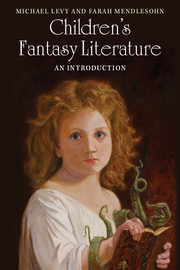Book contents
- Frontmatter
- Contents
- Acknowledgements
- Introduction
- 1 How fantasy became children's literature
- 2 Fairies, ghouls and goblins: the realms of Victorian and Edwardian fancy
- 3 The American search for an American childhood
- 4 British and Empire fantasy between the wars
- 5 The changing landscape of post-war fantasy
- 6 Folklore, fantasy and indigenous fantasy
- 7 Middle Earth, medievalism and mythopoeic fantasy
- 8 Harry Potter and children's fantasy since the 1990s
- 9 Romancing the teen
- Notes
- Further Reading
- Index
- References
Introduction
Published online by Cambridge University Press: 05 April 2016
- Frontmatter
- Contents
- Acknowledgements
- Introduction
- 1 How fantasy became children's literature
- 2 Fairies, ghouls and goblins: the realms of Victorian and Edwardian fancy
- 3 The American search for an American childhood
- 4 British and Empire fantasy between the wars
- 5 The changing landscape of post-war fantasy
- 6 Folklore, fantasy and indigenous fantasy
- 7 Middle Earth, medievalism and mythopoeic fantasy
- 8 Harry Potter and children's fantasy since the 1990s
- 9 Romancing the teen
- Notes
- Further Reading
- Index
- References
Summary
The aim of this book is to bring together two traditions of criticism, that of the literature of the fantastic, and that of children's literature. In addition, this book aims to situate children's fantasy in the context of changing ideas of childhood across three centuries; and perhaps most crucially, to consider the effect which the extension of childhood has had upon the writing and publishing of children's fiction. It is a story of separate but overlapping traditions, that of the British Empire and later the Commonwealth, and that of the United States and eventually North America, and of European traditions that have influenced both.
The study of the literature of the fantastic is relatively recent, and in some ways still underdeveloped: the crucial critical texts in the field still number less than ten, and until recently focused primarily on defending and defining fantasy. That fantasy has needed defending stems from the division between high and low in our literary culture, in which belief in mimesis, the idea that a writer or artist can accurately describe reality, took centre stage. Kathryn Hume, in her landmark 1984 study Fantasy and Mimesis: Responses to Reality in Western Literature, wrote, ‘It is an astonishing tribute to the eloquence and rigour of Plato and Aristotle as originators of western critical theory that most subsequent critics have assumed mimetic representations to be the essential relationship between text and the real world’, but it is in some ways not astonishing at all. Christianity is a hybrid of Greek and Judaic ideas of the world: the first saw literature as primarily moral, the second as primarily historical. The Greek gods and their fantastical adventures were not moral, and to Christians were positively immoral; it was easiest to dismiss the unreality that they represented. Kathryn Hume constructs a critical thread through Tasso, Hobbes and David Hume, who, she reminds us, actually ‘disparages literary fantasy as a threat to sanity’. John Bunyan, author of one of the great taproot texts of the quest fantasy, explicitly denied that The Pilgrim's Progress was fantasy. During the Renaissance, perpetrators of such ‘lies’, from Boccaccio to Sir Philip Sidney, complained about those who criticized their work on these grounds.
- Type
- Chapter
- Information
- Children's Fantasy LiteratureAn Introduction, pp. 1 - 10Publisher: Cambridge University PressPrint publication year: 2016



